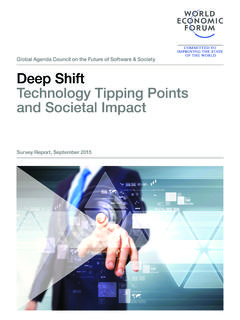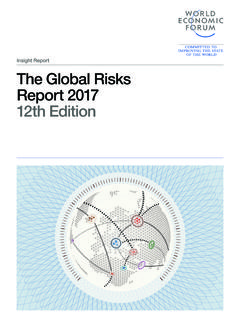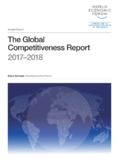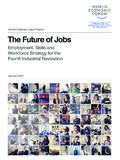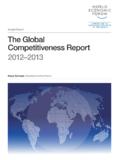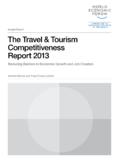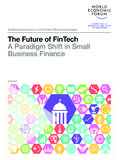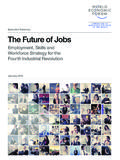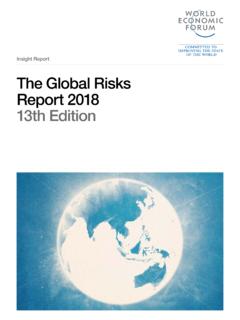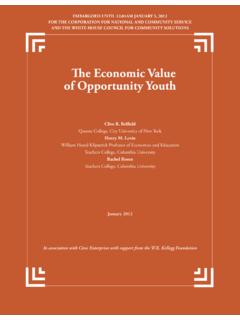Transcription of Global Agenda Council on Employment Matching …
1 Global Agenda Council on Employment Matching skills and labour market Needs Building social Partnerships for Better skills and Better Jobs Davos-Klosters, Switzerland 22-25 January January 2014. World Economic Forum Global Agenda Council on Employment The Global Agenda Council on Employment would like to thank Glenda Quintini from the OECD and Konstantinos Pouliakas from CEDEFOP for their help in preparing this paper World Economic Forum 2014 - All rights reserved. No part of this publication may be reproduced or transmitted in any form or by any means, including photocopying and recording, or by any information storage and retrieval system. The views expressed are those of certain participants in the discussion and do not necessarily reflect the views of all participants or of the World Economic Forum. REF 060114.
2 Contents 5 Executive Summary 7 1. skills Mismatch - An Issue of Worldwide Concer 8 2. Taking Stock of the skills Mismatch 15 3. Policies and Practices to Adress the skills Mismatch 22 4. Conclusions 23 Bibliography 26 Endnotes Building social Partnerships for Better skills and Better Jobs 3. Members of the Global Agenda Council on Employment Stefano Scarpetta, Director, Directorate for Employment , labour and social Affairs (DELSA), Organisation for Economic Co-operation and Development (OECD), Paris, France Ann Bernstein, Executive Director, Centre for Development Enterprise, South Africa Maggie Berry, Executive Director for Europe, WEConnect International, United Kingdom Tito Boeri, Director, Fondazione Rodolfo Debenedetti, Italy Peter Cappelli, George W. Taylor Professor of Management, Wharton School, University of Pennsylvania, USA.
3 Marie-Claire Carr re-G e, President, Conseil d'Orientation pour l'Emploi (COE), France David Coats, Research Fellow, Smith Institute, United Kingdom Zeynep Dagli, Founder and Chief Executive Officer, Momento, Turkey Pascaline Descy, Head of Unit, Research and Policy Analysis, European Centre for the Development of Vocational Training (CEDEFOP), Greece Dong Keyong, Dean, School of Public Administration and Policy, Renmin University, People's Republic of China John Evans, General Secretary, Trade Union Advisory Committee to the OECD, France Prakash Loungani, Adviser, Research Department, International Monetary Fund (IMF), Washington DC, USA. Iyad Malas, Chief Executive Officer, Majid Al Futtaim Group, United Arab Emirates Stephen Pursey, Director, Policy Integration Department, and Senior Adviser to the Director-General, International labour Organization, Washington DC.
4 Andr s Rodr guez-Pose, Professor, London School of Economics and Political Science, United Kingdom Hanne Shapiro, Centre Manager, Policy and Business Analysis, Danish Technological Institute, Denmark Richard Shediac, Senior Vice-President, Booz and Company, United Arab Emirates Srinivas, Member of the Board, Infosys, United Kingdom Brent Wilton, Deputy Secretary-General, International Organization of Employers (IOE), Geneva, Switzerland Jane Zhang Youyun, Executive Vice-President, China Association for Employment Promotion (CAEP), People's Republic of China 4 Matching skills and labour market Needs Executive Summary Main Findings Policy Recommendations Stemming the rise in structural unemployment, and in skills are a critical asset for individuals, businesses some types of skills mismatch resulting from the economic and societies.
5 The importance of skills is even more crisis, requires immediate action, on top of a long-term pronounced in a dynamic, globalized world. Building basic comprehensive strategy. Due to the prolonged recession, skills early on, by broadening and improving the quality of many unemployed people are facing few job opportunities early childhood, is essential. But it is also crucial to ensure and are more likely to accept Employment that is not well that skills taught at school are relevant for the working matched to their skills . world; that they are maintained and further improved during working life; and that they are recognized and used by Job creation is key to tackling high and increasingly employers once people are in the labour market . persistent unemployment and underemployment in many countries. However, promoting jobs without paying due Matching skills and jobs has become a high-priority attention to their quality and to the skills required may policy concern.
6 skills mismatches occur when workers only buy time and ultimately prolong the jobs crisis. Public have either fewer or more skills than jobs require. Some Employment services have an important role in ensuring that mismatch is inevitable, as the labour market involves the return to job growth does not come at the expense of complex decisions by employers and workers and depends lower-quality skill matches. Activation strategies should not on many external factors. But high and persistent skills only focus on the immediate benefit of filling a job vacancy, mismatch is costly for employers, workers and society at but also consider the long-term consequences of training large. and placement decisions on individuals' employability and adaptability. skills mismatch has become more prominent in the Global economic crisis.
7 However, it is primarily a Adopting a Matching skills approach during the crisis structural issue and as such existed prior to the recent means providing the right skills needed in the labour market , Global economic slowdown. For the same reason, contrary while generating the necessary economic dynamism to to what some commentators believe, current record-high generate new jobs. Apprenticeships and the provision of unemployment rates cannot be attributed to skills mismatch. workplace training can help both young people and the Indeed, there is no evidence that skill levels have collapsed unemployed to build links with the labour market and gain during the crisis. useful work-related skills . Knowledge clusters, in which companies adopt innovative product market strategies and Many employers report difficulties in finding suitably interact with educational institutions, can foster the creation skilled workers.
8 Although part of these difficulties are of skill-intensive jobs and a better match with workforce related to skill gaps and deficits in specific sectors, skills . occupations and regions, they are mostly explained by factors other than skills , such as uncompetitive wages, labour market policies should focus on building the human unattractive working conditions, poor recruitment policies capital of the low-skilled unemployed. For this, a shift is and/or mismatch between the location of skills and jobs. As required from the work-first approach, often used in a result, many shortages could be addressed by changes in activation strategies, to a learn-first process primarily training and recruitment practices, as well as by facilitating through workplace learning, emphasizing the retraining labour mobility. or skills upgrading of job seekers with poor skills and low qualifications.
9 In the current context of weak labour demand A more worrying phenomenon is sizeable qualification in a number of countries, this could potentially improve the mismatch. Affecting workers, firms and the overall match of job seekers' skills with those skills likely required by economy, qualification mismatch occurs when a worker's jobs created once the recovery strengthens. qualification level is higher or lower than that required by the job. Although the match between what people can Reducing skills mismatch with lasting effect and helping actually do and the content of their jobs may improve over economies make the most of their workforce skills require time, qualification mismatch can be persistent and leave collaborative effort from all stakeholders. First, action is an adverse or scarring effect on an individual's career.
10 In needed to reduce the gap between knowledge generated addition, unused skills will atrophy, resulting in a partial loss in the educational system and the skills demanded by of the (initial) investment in them. Even when adjustment employers. Second, continuing intervention is necessary takes place, it may be costly and prevent the adoption of during the Employment life cycle, targeting continuous skill new technologies. development and use. Building social Partnerships for Better skills and Better Jobs 5. Improving educational-system responsiveness to labour market needs, and ensuring that students complete their schooling with skills needed to find work, require collaboration between employers and public authorities. People with low basic skills , constituting a high proportion of the population in some countries, remains a serious problem as they do not have the minimum skills required by the labour market .
